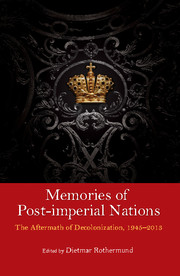Book contents
- Frontmatter
- Contents
- Preface
- Introduction
- 1 Memory of Empire in Britain: A Preliminary View
- 2 Ruptures and Dissonance: Post-colonial Migrations and the Remembrance of Colonialism in the Netherlands
- 3 A Distinctive Ugliness: Colonial Memory in Belgium
- 4 The Post-colonial Encounter in France
- 5 Ideologies of Exceptionality and the Legacies of Empire in Portugal
- 6 Post-colonial Italy: The Case of a Small and Belated Empire: From Strong Emotions to Bigger Problems
- 7 Post-imperial Japan in Transnational Perspective
- 8 Memories of Post-imperial Nations
- 9 A View from the Gallery: Perspective of a ‘Colonized’ on Post-imperial Memories
- Contributors
- Index
2 - Ruptures and Dissonance: Post-colonial Migrations and the Remembrance of Colonialism in the Netherlands
Published online by Cambridge University Press: 05 September 2015
- Frontmatter
- Contents
- Preface
- Introduction
- 1 Memory of Empire in Britain: A Preliminary View
- 2 Ruptures and Dissonance: Post-colonial Migrations and the Remembrance of Colonialism in the Netherlands
- 3 A Distinctive Ugliness: Colonial Memory in Belgium
- 4 The Post-colonial Encounter in France
- 5 Ideologies of Exceptionality and the Legacies of Empire in Portugal
- 6 Post-colonial Italy: The Case of a Small and Belated Empire: From Strong Emotions to Bigger Problems
- 7 Post-imperial Japan in Transnational Perspective
- 8 Memories of Post-imperial Nations
- 9 A View from the Gallery: Perspective of a ‘Colonized’ on Post-imperial Memories
- Contributors
- Index
Summary
How does a former colonial power deal with its colonial past, generations after the loss of empire? This is the central question in this chapter on the remembrance of colonialism in the Netherlands. The following is not an analysis of recent historiography rather the focus is on public history. What changed in the ways the colonial past was discussed in the public arena, if at all, and what changes in society contributed to such changes? Of course, decolonization mattered, as did globalization. But the specific thesis underlying this contribution is that the formation of post-colonial migrant communities in the Netherlands was fundamental to the ways in which colonial history was inserted in the national ‘canon’ of history.
The decolonization of the Dutch colonial empire proceeded unevenly and with highly divergent results in Indonesia and the Caribbean. In all cases, decolonization sparked substantial migrations to the metropolis. Today, the highly diverse post-colonial communities in the Netherlands number over one million Dutch in a total population of 16.5 million. The resultant post-colonial communities enacted a strong and often contradictory impact on the ways colonialism and decolonization are remembered in post-colonial Netherlands. The chapter proposes that post-colonial identity politics and the urge for recognition in the national ‘memory culture’ may be understood as an indication not only of frustration over a painful (post)colonial past, but equally of successful integration and in some ways as an attempt to cling to a fading ‘colonial’, pre-migration identity. Some of this is typical of post-colonial communities and identity politics elsewhere in Western Europe and beyond, some is typical of the Dutch case.
Decolonization and post-colonial migrations to the Netherlands
On the eve of World War II, the Dutch colonial empire consisted of one huge colony – the Indonesian archipelago – and two tiny ones in the Caribbean. An enormous demographic disparity characterized this empire.
- Type
- Chapter
- Information
- Memories of Post-Imperial NationsThe Aftermath of Decolonization, 1945–2013, pp. 38 - 57Publisher: Cambridge University PressPrint publication year: 2015
- 2
- Cited by



